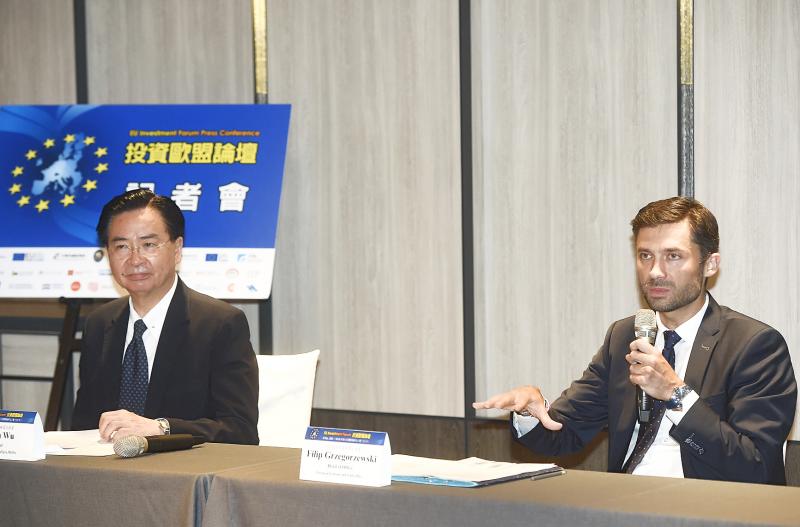More Taiwanese investments in Europe would yield economic gains and closer ties, European Economic and Trade Office in Taiwan Director Filip Grzegorzewski told a news conference yesterday ahead of the office’s first European Investment Forum in Taipei on Tuesday next week.
With one-quarter of Taiwan’s foreign direct investment being from the EU while only 2 percent of Taiwan’s outgoing investment going to the bloc, Grzegorzewski said he hoped that the forum would encourage more Taiwanese investment in Europe, resulting in stronger connections.
“We make jobs here [in Taiwan], we help Taiwan grow into an international economy,” he said. “Now we are attracting Taiwanese investment to Europe to balance this economic relationship, basically also to make sure our bond is strong. The more interactions we have, the more connected we get.”

Photo: Chien Jung-fong, Taipei Times
The forum, which seeks to pave the way for closer Taiwan-EU business cooperation in the post-COVID-19 world economy, would feature presentations on the information and communications technology, automotive and health industries in Europe, Grzegorzewski said.
Taiwanese businesses would share their experiences of investing in the EU, he said.
There is to be an investment fair at which Taiwanese investors can talk to representatives from EU member states directly to facilitate bilateral collaborations, he said.
Taiwanese firms can further expand their markets by investing in EU member states, leveraging from the 41 trade agreements the regional bloc has signed with 72 countries, he said.
Grzegorzewski said he is often asked why there is no European equivalent of the “Select USA” program, which introduces Taiwanese firms to opportunities in the US.
“This forum is the first step,” he said.
When asked whether trade ties with the EU might be affected by pressure from China, Minister of Foreign Affairs Joseph Wu (吳釗燮) told the news conference that Taiwan would not be intentionally provocative, but would keep on doing business.
“Going back decades now, China has never stopped threatening Taiwan with the use of force. And while the pressure has increased over the past few years, Taiwan is still a top investment destination in Asia and continues to be heavily favored by European investors,” Wu said.
Taiwan would continue with its policy of not rocking the boat, while keeping an eye on Chinese threats, he said.
“I believe that raising Taiwan’s visibility in Europe and Europe’s visibility in Taiwan is very important,” Wu said.
“I am sure we have all seen that the Taiwan-European relationship has been strengthening by leaps and bounds in the past year or two,” he said, citing the 90-member delegation that Czech Senate President Milos Vystrcil led to Taiwan.
The forum is to take place at the Taipei International Convention Center.
It is co-organized by the European Economic and Trade Office, EU member states’ representative offices, the Ministry of Economic Affairs and the Ministry of Foreign Affairs.

SEMICONDUCTORS: The German laser and plasma generator company will expand its local services as its specialized offerings support Taiwan’s semiconductor industries Trumpf SE + Co KG, a global leader in supplying laser technology and plasma generators used in chip production, is expanding its investments in Taiwan in an effort to deeply integrate into the global semiconductor supply chain in the pursuit of growth. The company, headquartered in Ditzingen, Germany, has invested significantly in a newly inaugurated regional technical center for plasma generators in Taoyuan, its latest expansion in Taiwan after being engaged in various industries for more than 25 years. The center, the first of its kind Trumpf built outside Germany, aims to serve customers from Taiwan, Japan, Southeast Asia and South Korea,

POWERING UP: PSUs for AI servers made up about 50% of Delta’s total server PSU revenue during the first three quarters of last year, the company said Power supply and electronic components maker Delta Electronics Inc (台達電) reported record-high revenue of NT$161.61 billion (US$5.11 billion) for last quarter and said it remains positive about this quarter. Last quarter’s figure was up 7.6 percent from the previous quarter and 41.51 percent higher than a year earlier, and largely in line with Yuanta Securities Investment Consulting Co’s (元大投顧) forecast of NT$160 billion. Delta’s annual revenue last year rose 31.76 percent year-on-year to NT$554.89 billion, also a record high for the company. Its strong performance reflected continued demand for high-performance power solutions and advanced liquid-cooling products used in artificial intelligence (AI) data centers,

Gasoline and diesel prices at domestic fuel stations are to fall NT$0.2 per liter this week, down for a second consecutive week, CPC Corp, Taiwan (台灣中油) and Formosa Petrochemical Corp (台塑石化) announced yesterday. Effective today, gasoline prices at CPC and Formosa stations are to drop to NT$26.4, NT$27.9 and NT$29.9 per liter for 92, 95 and 98-octane unleaded gasoline respectively, the companies said in separate statements. The price of premium diesel is to fall to NT$24.8 per liter at CPC stations and NT$24.6 at Formosa pumps, they said. The price adjustments came even as international crude oil prices rose last week, as traders

SIZE MATTERS: TSMC started phasing out 8-inch wafer production last year, while Samsung is more aggressively retiring 8-inch capacity, TrendForce said Chipmakers are expected to raise prices of 8-inch wafers by up to 20 percent this year on concern over supply constraints as major contract chipmakers Taiwan Semiconductor Manufacturing Co (TSMC, 台積電) and Samsung Electronics Co gradually retire less advanced wafer capacity, TrendForce Corp (集邦科技) said yesterday. It is the first significant across-the-board price hike since a global semiconductor correction in 2023, the Taipei-based market researcher said in a report. Global 8-inch wafer capacity slid 0.3 percent year-on-year last year, although 8-inch wafer prices still hovered at relatively stable levels throughout the year, TrendForce said. The downward trend is expected to continue this year,